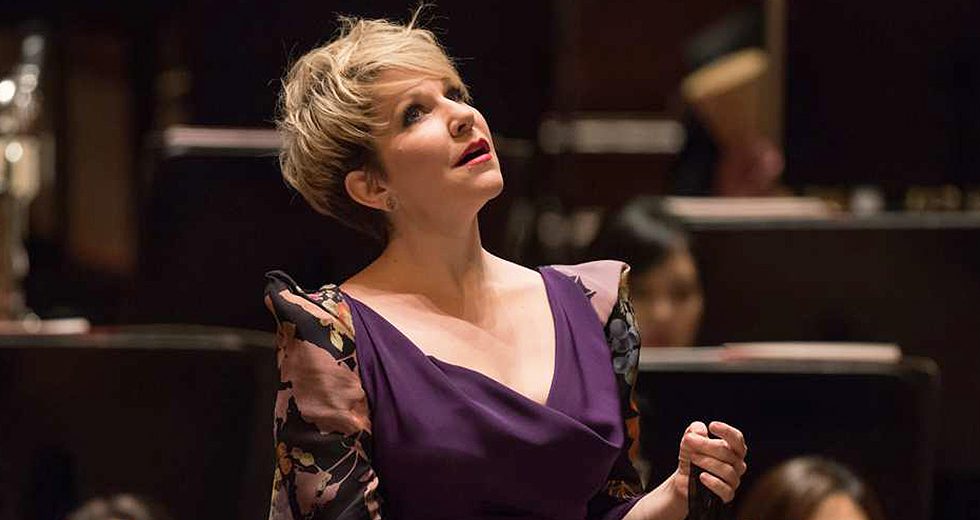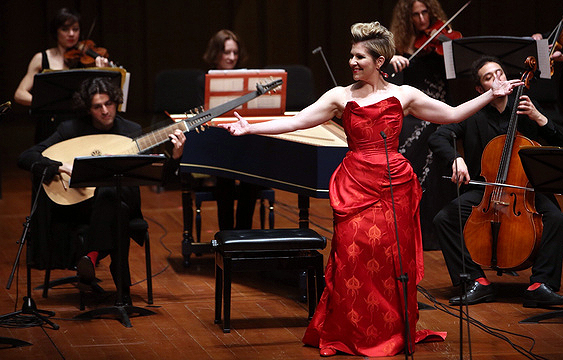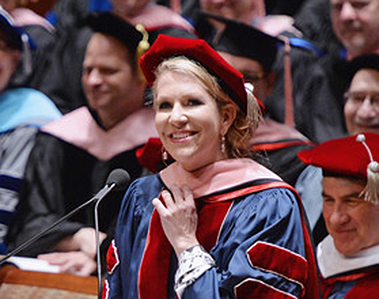
Few if any of operatic singers today are more esteemed than mezzo-soprano Joyce DiDonato. Critics and colleagues alike have lavished praise not only on the sheer beauty of her voice but also on her refined technique, artistic honesty and natural expressiveness. Take the extraordinary tribute that composer Jake Heggie wrote when Gramophone magazine named her to its Hall of Fame: “The staggering, joyful artistry of Joyce DiDonato reminds us that in any generation there are few giants. Joyce is not only a great, brave and inspiring artist — one of the finest singers of our time — but she is also a transformative presence in the arts. Those who know her repertoire are in awe of her gifts, and those who know nothing of it are instantly dazzled and engaged.”
Though she has appeared with many of the world’s most prestigious opera companies and symphony orchestras, one such organization has eluded her: the Chicago Symphony Orchestra. But that will change Sept. 29-Oct. 1, when she makes her CSO debut, joining Music Director Riccardo Muti in the orchestra’s first performances of Giuseppe Martucci’s song cycle, La canzone dei ricordi (“The Song of Memory”). Later this season, she will return to Chicago to present “In War and Peace: Harmony Through Music,” a program of Baroque arias on Dec. 9 at the Harris Theater for Music and Dance.

Joyce DiDonato will appear with the period-instrument ensemble Il pomo d’oro on Dec. 9 at the Harris Theater for Music and Dance.
“It’s a fabulous and welcome twist of fate, as I just adore Chicago,” DiDonato said in an e-mail interview. “The great thing is that I have the opportunity to sing with this legendary orchestra for the first time and to meet Maestro Muti again for only the second time. I will treasure the moment, I’m certain. And to come back later with a personal project that means so much to me will be a great gift.”
Performing La canzone, an 1886-87 setting of seven poems by Rocco Pagliera, was Muti’s idea. “As I understand it, it is a work he has long loved and has waited to share with the Chicago audience,” she said. “They are rich, lyrical, luxurious pieces, and I so look forward to debuting them with Maestro, who so clearly loves them very much.”
“In War and Peace,” a program that she is touring internationally and has recorded, features arias by noted Baroque-era composers as George Frideric Handel, Leonardo Leo, Claudio Monteverdi and Henry Purcell. She will be accompanied by Il pomo d’oro, a fast-rising, European-based, period-instrument ensemble that was founded in 2012.
“The state of the world today is my motivation,” she said. “I believe so strongly in the power of music to transform, to heal, to inspire but also to bring relief and comfort. These are all things I believe we need in abundance at the moment. The arias were all written 300-400 years ago, and here we are in desperate need of their messages and ‘teachings,’ if you will — that peace is a noble effort and that it is possible.
“My hope is that people who listen to the album or who attend the concert will be given the opportunity and the inspiration to pause for a moment and allow themselves to feel and to examine what peace feels like within themselves — not necessarily bearing the weight of solving world peace in a global way — but completely within themselves. This, to me, is a powerful way to use the music of the ages to touch our hearts here and now.”
Rather than let her success go to her head, DiDonato seems humbled by it. Indeed, she is one of the most undiva-like divas around. As Alex Ross recounts in his 2013 profile of the singer in the New Yorker, she had no qualms about showing up with some of her old friends on a karaoke night at an Applebee’s restaurant in Wichita, Kan. (But, for the record, she did not get up and take a turn at the microphone.) As for her unassuming manner, she said, “It simply is a matter of being true to myself and walking through this career with my own two feet in a sincere and grateful way. I tried on the ‘diva’ personality early on, assuming that was required of a young singer, and not only was it a lot of extra work, it simply didn’t fit me. Funnily enough, I think that is when my career started flying a bit higher — when the audience recognized that they were seeing me on the stage, not a ‘persona.’”

Joyce DiDonato delivers the 2014 commencement speech at the Juilliard School.
Some of this humility can no doubt be attributed to her upbringing in Prairie Village, Kan., a suburb of Kansas City, Mo. She sang in musicals in high school but never imagined herself as a performer, aspiring instead to be a music teacher. She attended Wichita State University, not the famed Juilliard School in New York. Indeed, in 2014, when DiDonato was invited to give the commencement address at Juilliard, she pointed to this discrepancy and spoke eloquently of the struggles that she faced as a young singer when almost no one saw much potential in her.
“You, my friends, are living the dream!” she said to the students. “I wish I had had the foresight when invited to speak here today to ask them to break with tradition and print my old biography from when I was your age instead of my current one. A great example of contrasts, it would have shown you that despite my ‘star turn’ as the off-stage lover in Il Tabarro with my one, single, solitary line (did I mention it was off-stage?), and that despite being the only young artist of my class to fail at securing management until the ripe age of 29, and despite my evaluation sheet for the Houston Opera Studio, which simply declared me to possess ‘not much talent,’ and that despite way more rejections and easy dismissals than actual ‘yeses,’ despite all of that, I am somehow, miraculously standing before you all today, regaled in an admittedly different kind of designer gown, dispensing tidbits of ‘wisdom’ before a group of artists who — and this is honestly no exaggeration — artists who I never could have been classmates with, because there truly is no way I could have gained admission to your school back in the day. I simply wasn’t ready back then. That is the truth. One never, ever knows where their journey will lead them.”
In college, she became enamored with opera, and, in 1992, she enrolled at the Academy of Vocal Arts in Philadelphia to begin her real training. After serving as an apprentice in 1995 at the Santa Fe Opera, she joined the young artist studio at the Houston Grand Opera; with the help of an instructor there, she essentially rebuilt her whole approach to singing. After she enjoyed a bit of success, her manager set her up with 13 auditions in Europe, and after the last one, the famed Paris Opera hired her to sing Rosina in a 2002 production of The Barber of Seville. That endorsement got her noticed, and her operatic odyssey took off. “Every moment of this career has taken me by surprise and surpassed my expectations,” she said. “I feel immense gratitude for all that has come to me.”
Earlier this year, DiDonato won her second Grammy Award for “Joyce and Tony: Live at Wigmore Hall” (2015). She and pianist Antonio Pappano (better known as a conductor), recorded the much-lauded two-CD set in 2014 during a performance at Wigmore Hall. They mixed Italian repertoire, such as four selections by little-known Neapolitan composer Francesco Santoliquido, with gems from the Great American Songbook. “I was in Hamburg, Germany, working on a film and watched the Grammys live on the internet,” she said. “I think my category came up around 12:30 a.m. and I was certain I wouldn’t win this time around, but I was watching out of curiosity to see who would win. And when they said my name, I nearly broke my leg jumping out of bed with shock! It meant so much to me to share this with Tony Pappano, and it was truly one of the great music-making experiences of my life.”
If it sounds like DiDonato is a singer who knows how to have fun, that’s no accident. Indeed, in that Juilliard commencement address, she exhorted the students to make sure they left time in their demanding careers to do just that. “My priority has always been the art, and serving the art and the public as best I can, but I’ve made a concerted effort to be sure that I’m enjoying the journey along the way,” she said. “I don’t see the merit in suffering through something as glorious as having the privilege of immersing oneself in music for a living. This is absolutely a challenging and demanding career, but I work very hard to be sure that I revel in the sublime aspects of it more than I simply endure the hard parts.”
Kyle MacMillan, former classical music critic of the Denver Post, is a Chicago-based arts journalist.
TOP: Joyce DiDonato presents “In War and Peace: Harmony Through Music” with Il pomo d’oro. | Photo: Simon van Boxtel